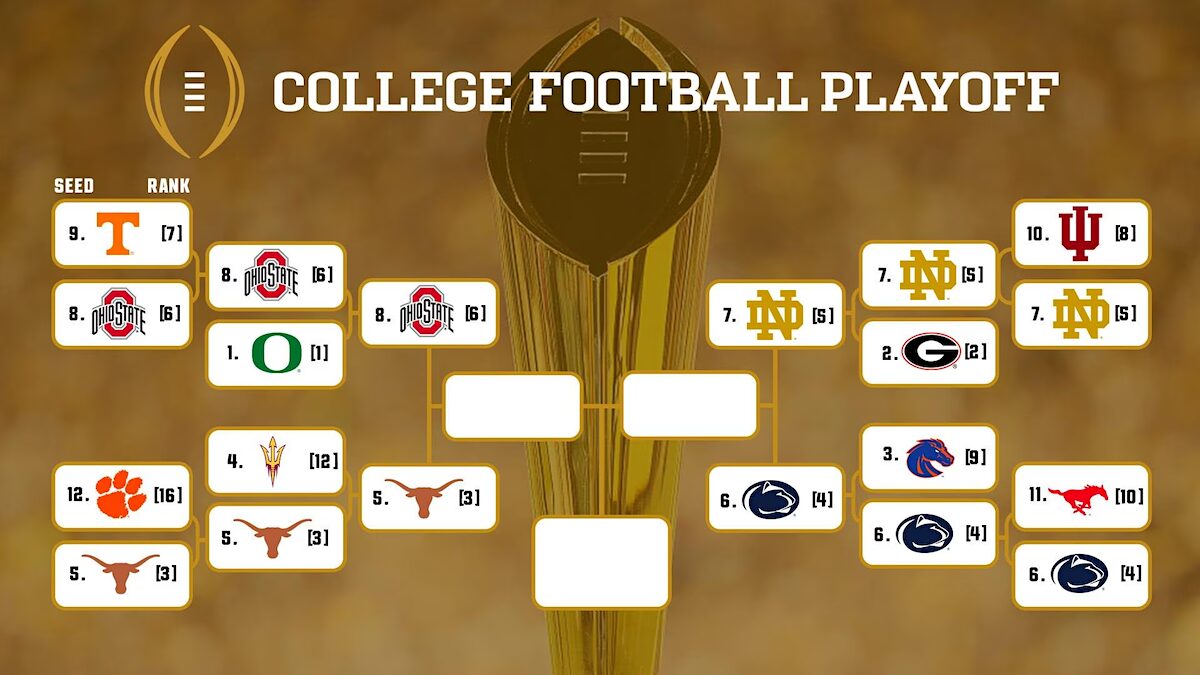
I despise results-based thinking.
Essentially, if something “works” then, of course, it was the right thing to do.
Football is full of perfect examples, like when a team decides to “go for it” on fourth down and long in a situation where it’s unnecessary, unlikely to work and/or likely to backfire with massive consequences. Still, the coach throws caution (and logic) to the wind and has his quarterback throw a YOLO pass down the field, which is miraculously completed.
Did the play’s success make the decision a “right” one? Well, those who base their (flawed) logic on results-oriented thinking would bellow an emphatic, “Yes!”
The inverse is also true within this warped worldview: If a choice results in failure, then it obviously was the wrong decision.
As America approaches the Final Four in the inaugural year of a 12-team college football playoff, we should not immediately judge it as a failure just because most of the games have been unentertaining, non-competitive blowouts thus far.
If Ohio State and Tennessee scheduled a regular-season game, everyone would be applauding the two programs’ courage for doing so, and we would be champing at the bit for the kickoff. The same goes for Texas vs. Clemson, Penn State vs. SMU and, yes, even Notre Dame vs. Indiana. Each of those games pit power conference teams against power conference teams, something sorely lacking in the first month of most football seasons. Even Boise State vs. Penn State would be overwhelmingly welcomed in the regular season, since the mid-major Broncos have punched above their weight class for two decades.
So, why are people ready to storm the Bastille when those specific matchups actually happened in this year’s postseason? Why would anyone proclaim the new playoff system an epic disaster simply because all the aforementioned games ended up being blowouts?
Well, we are witnessing results-based thinking in real time.
The fact those games unfolded less auspiciously than most people wanted does not mean the enlarged playoff field has failed. It simply means … football happens, as shown by all four of the teams with first-round byes losing last week. The first game of this year’s playoff was Penn State’s 33-24 win over what appeared to be an overmatched Indiana squad. The Hoosiers were eviscerated by talking heads and on social media — even by other college head coaches — as being unworthy of a playoff berth. As it turns out, however, Indiana’s only two losses of the season were against, ahem, two of the four teams still alive in the playoff.
The argument that only two or three teams are “good enough” to win the national championship each season also seems illogical when considering there have been just six undefeated champions in the last 15 years. Somewhere along the line, the best teams usually get tripped at least once, and usually against teams outside of the “good enough” category.
Eventually it’ll happen in the playoffs, so just give it a chance.
What were some other results from this bowl season to which to apply misbegotten logic? Let’s look in this bowl version of Hangover Highlights!
Jeremy Cowen has been a NonDoc commentator and contributing reporter since the site launched in 2015. After growing up in Hartshorne, he graduated with a journalism degree from the University of Oklahoma. His 30-year career in journalism and public relations has included teaching courses about writing for hundreds of OU mass communications students.
Jeremy Cowen has been a NonDoc commentator and contributing reporter since the site launched in 2015. After growing up in Hartshorne, he graduated with a journalism degree from the University of Oklahoma. His 30-year career in journalism and public relations has included teaching courses about writing for hundreds of OU mass communications students.

